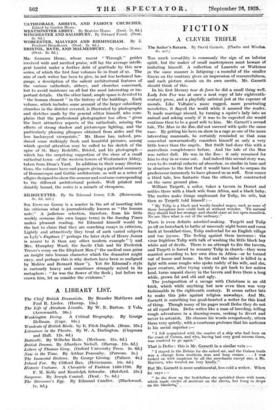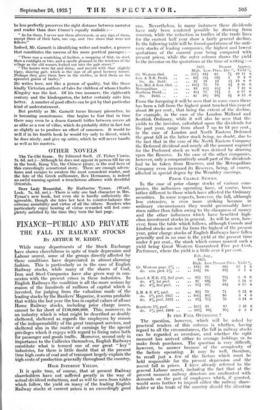FICTION
A CLEVER TRIFLE
Too much versatility is commonly the sign of an inferior spirit, but the maker of small masterpieces must beware of imitating himself. A collection of Lancrets or Watteaus
in the same manner is fatiguing : a roomful of the smaller Goyas on the contrary gives an impression of resourcefulness,
and each picture stands on its own merits. Mr. Garnett should think of this. • In his first literary tour de force he did a small thing well. Lady Into Fox was at once a neat copy of late eighteenth- century prose, and a playfully satirical jest at the expense of morals. Like Voltaire's more rugged, more penetrating novelettes, it flayed the world while it amused the reader. It made marriage absurd, by turning a. squire's lady into an animal and asking sourly if it was to be expected she would continue then to be a good wife to him. Mr. Garnett's second tale, The Man in the Zoo, did not succeed with quite the same ease. By getting his hero on show in a cage as one of the more interesting mammals, he certainly reminded us that man somewhat unwarrantedly considers himself as only a very little lower than the angels. But Swift had done this with a marvellous completeness before. And the tale of the Man was rather dull. He was in the Zoo : it only remained for him to stay in or come out. And indeed this second story was, even to its central reductio ad absurdum, so similar in tone and in structure to the first that it would have had to surpass its predecessor immensely to have pleased us so well. Now comes a third tale, less fantastic than the others, but constructed on the same ground plan.
William Targett, a sailor, takes a tavern in Dorset and settles there with a black wife from Africa, and a black baby. The rustics make things unpleasant for Tulip, his wife, but then as Targett _told himself :-
" My Tulip is a black and woolly-headed negro, such as none of these bumpkins here could look at without wonder. 'Tis natural they should find her strange, and should stare at her open-mouthed. No one likes what is out of the ordinary."
There is even definite mischief-making. Targett and Tulip go off on horseback to bathe at unseemly night hours and come back at breakfast-time, Tulip underclad for an English village and too joyous. The feeling against them increases : the vicar frightens Tulip with talk of washing the little black boy white and of devils. There is an attempt to \fire the tavern, and Targett is forced to remarry Tulip in church-they were married according to her own rites in Africa-or be turned out of house and home. In the end the sailor is killed in a fight with some roughs who spoke rudely of his wife, and she; poor creature, after trying vainly to get back to her native
land, turns unpaid slavey in the tavern and lives there a long. while, grown fat and old and ugly.
The juxtaposition of a savage with Christians is an old trick, which while anything but new even then was very fashionable in the eighteenth century. It seems rather late to make this joke against religion nowadays. And Mr.
Garnett is something too good-hearted a writer for this kind. of thing. Though many of his pages recall Defoe they do not at all equal him. Defoe writes like a man of breeding, telling rough adventures in a drawing-room, seeking to divert and never to astonish. He chooses his words scrupulously, utters
them very quietly, with a courteous pretence that his audience is his social superior :-
"I fell acquainted with the master of a ship who had been on the coast of Guinea, and who, having had very good success there, was resolved to go again."
That is Defoe : this is Mr. Garnett in a similar vein
" I stayed in the Belsize for she suited me, and the Guinea trade was a change from southern seas and long cruises . . . I was looked on with suspicion by all .the merchants except one, a Mr. Martinez, who treated me very kindly.".
But Mr. Garnett is more sentimental, less cold a writer. When he says :-
" As she drew up the bedclothes she sprinkled them with tears,• which made circles of moisture on the sheets, but hung in drops on the blankets," _ -
he less perfectly preserves the right distance between narrator and reader than does Crusoe's equally realistic As for them, I never saw them afterwards, or any sign of them, except three of their hats, one cap, and two shoes that were not fellows."
Indeed, Mr. Garnett is identifying writer and reader, a process that constitutes the success of his more poetical passages :-
" There was a scratching of lucifers, a snapping of flint, on steel, then a rushlight or two, and a candle gleamed in the windows of the village as the old women looked out into the pale street." " The horses Were fat and shiny, and moved with that slightly tipsy, dancing gait, which is the sign of all good brewery horses. Perhaps they give them beer in the stables, or feed them on the sprouted grains of barley."
He writes here, not like a person of quality, but like those kindly Victorian authors of tales for children of whom Charles Kingsley was the last. Of his two manners, the eighteenth century and the kindergarten, the latter certainly suits him better. A number of good effects can be got by that particular kind of understatement.
But prettily as Mr. Garnett turns literary pirouettes, he Is becoming monotonous. One begins to fear that in time there may even be a dozen Garnett trifles between covers all as alike as a row of villas, which do probably differ in fact but so slightly as to produce an effect of sameness. It would be well if in his fourth book he would try only to divert, which he does nicely, and give up satire, which he will never handle as well as his masters.



















































 Previous page
Previous page